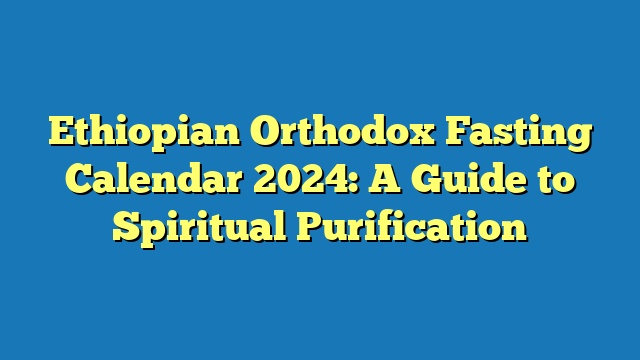The Ethiopian Orthodox fasting calendar for 2024 in PDF provides a detailed schedule of fasting periods observed by the Ethiopian Orthodox Tewahedo Church. It includes information on fasting days, what foods are prohibited during each fast, and the significance of each fast.
Fasting plays an important role in Ethiopian Orthodox Christianity as a means of spiritual purification and preparation for religious festivals. The fasting calendar serves as a valuable resource for church members to plan and adhere to these fasting practices, which have been observed for centuries and have a rich historical significance.
This article will provide an overview of the Ethiopian Orthodox fasting calendar for 2024, including the key fasting periods, their religious significance, and practical tips for observing the fasts.
Ethiopian Orthodox Fasting Calendar 2024 PDF
The Ethiopian Orthodox fasting calendar for 2024 provides a comprehensive guide to the fasting periods observed by the Ethiopian Orthodox Tewahedo Church. Here are ten key aspects of the Ethiopian Orthodox fasting calendar 2024 PDF:
- Fasting periods
- Fasting days
- Prohibited foods
- Religious significance
- Spiritual purification
- Preparation for festivals
- Historical significance
- Cultural practices
- Dietary restrictions
- Health implications
These aspects are interconnected and form an essential part of the Ethiopian Orthodox fasting tradition. The fasting periods are based on biblical and historical events and are observed to commemorate important religious occasions. During fasts, adherents abstain from certain foods and engage in spiritual practices such as prayer and meditation. The fasting calendar serves as a guide for church members to plan and adhere to these fasting practices, which have been observed for centuries and have a rich cultural and spiritual significance.
Fasting periods
Fasting periods are a critical component of the Ethiopian Orthodox fasting calendar 2024 PDF. The calendar outlines specific periods throughout the year when adherents are expected to abstain from certain foods and engage in spiritual practices. These fasting periods are based on biblical and historical events and are observed to commemorate important religious occasions. For example, the Great Fast, which precedes Easter, is a 55-day period of fasting that commemorates the 40 days that Jesus spent fasting in the wilderness. During this period, adherents abstain from meat, dairy, eggs, and fish, and they also engage in daily prayers and spiritual readings.
The Ethiopian Orthodox fasting calendar 2024 PDF provides a detailed schedule of fasting periods, including the start and end dates, the foods that are prohibited during each fast, and the religious significance of each fast. This information is essential for church members to plan and adhere to these fasting practices, which are considered an important part of the spiritual life. By observing the fasting periods, adherents demonstrate their commitment to their faith and their desire to grow closer to God.
In conclusion, the Ethiopian Orthodox fasting calendar 2024 PDF is a valuable resource for church members to understand and observe the fasting periods throughout the year. These fasting periods are a critical component of the Ethiopian Orthodox tradition and play a vital role in the spiritual lives of adherents.
Fasting days
Fasting days are a critical component of the Ethiopian Orthodox fasting calendar 2024 PDF. The calendar outlines specific days throughout the year when adherents are expected to abstain from certain foods and engage in spiritual practices. These fasting days are based on biblical and historical events and are observed to commemorate important religious occasions. For example, every Wednesday and Friday throughout the year are fasting days, as are the days leading up to major festivals such as Christmas and Easter.
During fasting days, adherents abstain from meat, dairy, eggs, and fish, and they also engage in daily prayers and spiritual readings. The Ethiopian Orthodox fasting calendar 2024 PDF provides a detailed schedule of fasting days, including the start and end times, the foods that are prohibited during each fast, and the religious significance of each fast. This information is essential for church members to plan and adhere to these fasting practices, which are considered an important part of the spiritual life. By observing the fasting days, adherents demonstrate their commitment to their faith and their desire to grow closer to God.
In conclusion, fasting days are a critical component of the Ethiopian Orthodox fasting calendar 2024 PDF and play a vital role in the spiritual lives of adherents. These fasting days are based on biblical and historical events and are observed to commemorate important religious occasions. By observing the fasting days, adherents demonstrate their commitment to their faith and their desire to grow closer to God.
Prohibited foods
Within the context of the Ethiopian Orthodox fasting calendar 2024 PDF, “prohibited foods” refer to specific dietary restrictions that adherents are expected to follow during designated fasting periods. These restrictions are rooted in religious and cultural traditions and play a significant role in the spiritual practices of Ethiopian Orthodox Christians.
-
Animal products
During fasting periods, adherents abstain from consuming meat, poultry, dairy, and eggs. These products are considered to be indulgent and are believed to hinder spiritual growth.
-
Stimulants
Alcohol, coffee, and tobacco are also prohibited during fasting periods. These substances are believed to cloud the mind and interfere with spiritual practices.
-
Unclean foods
Certain foods, such as pork and shellfish, are considered to be unclean and are therefore prohibited during fasting periods.
-
Highly processed foods
Foods that are highly processed or contain artificial ingredients are generally discouraged during fasting periods. These foods are believed to be less nutritious and can distract from spiritual practices.
By adhering to these dietary restrictions during fasting periods, Ethiopian Orthodox Christians demonstrate their commitment to their faith and their desire to purify their bodies and minds. These restrictions are an essential part of the spiritual practices outlined in the Ethiopian Orthodox fasting calendar 2024 PDF and contribute to the overall spiritual growth and well-being of adherents.
Religious significance
Within the context of the Ethiopian Orthodox fasting calendar 2024 PDF, “religious significance” refers to the spiritual and theological importance of fasting within the Ethiopian Orthodox Christian tradition. Fasting is considered a fundamental spiritual practice that enables adherents to deepen their connection with God, purify their hearts and minds, and prepare for significant religious occasions.
The Ethiopian Orthodox fasting calendar is structured around religious events and commemorations throughout the year. Each fasting period is associated with a specific religious significance, such as the commemoration of the life of Jesus Christ, the Virgin Mary, or various saints. During these fasting periods, adherents observe dietary restrictions, engage in regular prayers, and participate in spiritual readings to enhance their spiritual growth and strengthen their relationship with God.
For instance, the Great Fast, which precedes Easter, is a 55-day period of fasting that commemorates the 40 days Jesus spent fasting in the wilderness. During this time, adherents abstain from meat, dairy, eggs, and fish, and they also engage in daily prayers and spiritual readings. This fasting period is considered a critical time for spiritual reflection and preparation for the celebration of Easter, which marks the resurrection of Jesus Christ.
By understanding the religious significance of fasting within the Ethiopian Orthodox tradition, we gain insights into the spiritual practices and beliefs of this ancient Christian community. The Ethiopian Orthodox fasting calendar 2024 PDF serves as a valuable resource for adherents to observe these fasting periods meaningfully and connect with their religious heritage.
Spiritual purification
Within the context of the Ethiopian Orthodox fasting calendar 2024 PDF, “spiritual purification” refers to a profound spiritual process that adherents undertake to cleanse their hearts and minds and draw closer to God. This process is central to the Ethiopian Orthodox Christian tradition and is believed to be essential for personal growth and spiritual development.
The Ethiopian Orthodox fasting calendar 2024 PDF outlines specific fasting periods throughout the year, which are observed by adherents as a means of spiritual purification. During these fasting periods, adherents abstain from certain foods and engage in regular prayers, spiritual readings, and other devotional practices. This combination of dietary restrictions and spiritual practices is believed to create an environment conducive to self-reflection, repentance, and the purification of the soul.
Real-life examples of spiritual purification within the Ethiopian Orthodox fasting calendar 2024 PDF include the Great Fast, which precedes Easter, and the Fast of the Apostles, which precedes the feast of Pentecost. During these fasting periods, adherents abstain from meat, dairy, eggs, and fish, and they also engage in daily prayers, spiritual readings, and acts of charity. These practices are believed to help adherents their hearts and minds, making them more receptive to God’s grace and enabling them to participate fully in the spiritual celebrations that follow these fasting periods.
Understanding the connection between spiritual purification and the Ethiopian Orthodox fasting calendar 2024 PDF provides valuable insights into the spiritual practices and beliefs of this ancient Christian community. This understanding can also be applied to other religious traditions and spiritual practices that emphasize the importance of self-reflection, repentance, and purification as a means of drawing closer to the divine.
Preparation for festivals
Within the Ethiopian Orthodox fasting calendar 2024 PDF, “Preparation for festivals” holds great significance, as it encompasses a range of spiritual and practical aspects leading up to major religious celebrations. These preparations serve to create a conducive environment for spiritual growth, strengthen communal bonds, and honor the traditions of the Ethiopian Orthodox Church.
-
Spiritual cleansing
Before major festivals, adherents engage in fasting, prayer, and acts of charity to purify their hearts and minds. This spiritual cleansing prepares them to fully participate in the upcoming celebrations and receive blessings.
-
Community involvement
Festival preparations often involve communal activities, such as cleaning churches, preparing traditional dishes, and organizing gatherings. These activities foster a sense of unity and collaboration within the community.
-
Decorations and symbolism
Churches and homes are adorned with colorful decorations and symbols representing the upcoming festival. These decorations create a festive atmosphere and serve as reminders of the spiritual significance of the occasion.
-
Liturgical preparations
Priests and deacons undergo special liturgical preparations, including rehearsals and the preparation of liturgical materials, to ensure the smooth and meaningful conduct of festival services.
Preparation for festivals, as outlined in the Ethiopian Orthodox fasting calendar 2024 PDF, is an integral part of the spiritual and communal life of the Ethiopian Orthodox Church. These preparations not only create a festive atmosphere but also provide opportunities for spiritual growth, community building, and the preservation of cultural traditions.
Historical Significance
The Ethiopian Orthodox fasting calendar 2024 PDF holds immense historical significance, reflecting centuries-old traditions and spiritual practices within the Ethiopian Orthodox Tewahedo Church. This significance extends to various aspects, including:
-
Biblical Foundations
The fasting calendar draws inspiration from biblical events and teachings, particularly the fasting practices of Jesus Christ and his disciples. -
Early Church Influence
The calendar incorporates elements from the early Christian tradition, including the Lenten fast and other ascetic practices adopted by desert monks. -
Cultural Heritage
Over time, the fasting calendar has become deeply ingrained in Ethiopian culture and is widely observed as a symbol of religious devotion and cultural identity. -
Preservation of Tradition
The calendar serves as a repository of ancient spiritual practices and contributes to the preservation of Ethiopia’s rich religious heritage.
These historical dimensions underscore the profound importance of the Ethiopian Orthodox fasting calendar 2024 PDF, not only as a guide for spiritual observance but also as a testament to the enduring legacy of the Ethiopian Orthodox Church and its contribution to the cultural and religious landscape of Ethiopia.
Cultural practices
Within the context of the Ethiopian Orthodox fasting calendar 2024 PDF, “Cultural practices” encompass a wide range of traditional customs, rituals, and beliefs that are deeply intertwined with the religious observances outlined in the calendar. These practices have evolved over centuries and play a crucial role in shaping the spiritual and communal experiences of Ethiopian Orthodox Christians.
Cultural practices are a critical component of the Ethiopian Orthodox fasting calendar 2024 PDF as they provide a framework for understanding and enacting the religious principles embedded within the calendar. They influence how individuals and communities prepare for and observe fasting periods, including the types of foods that are consumed and avoided, the manner in which prayers are conducted, and the overallsurrounding religious observances.
Real-life examples of cultural practices within the Ethiopian Orthodox fasting calendar 2024 PDF include the preparation of traditional fasting dishes, such as injera and shiro, which are consumed during fasting periods. Additionally, the practice of communal and the use of incense during liturgical services are deeply rooted in Ethiopian cultural traditions and contribute to the unique spiritual atmosphere of these observances.
Understanding the connection between cultural practices and the Ethiopian Orthodox fasting calendar 2024 PDF has practical applications in various fields, including anthropology, cultural studies, and religious tourism. It enables researchers and practitioners to gain insights into the intricate relationship between religion and culture, and to appreciate the diverse ways in which religious traditions are expressed and experienced within different cultural contexts.
Dietary restrictions
Dietary restrictions are a fundamental component of the Ethiopian Orthodox fasting calendar 2024 pdf, shaping the spiritual and physical practices of adherents during designated fasting periods. These restrictions are rooted in religious beliefs and traditions, and their observance is considered essential for spiritual purification and growth.
The Ethiopian Orthodox fasting calendar 2024 pdf outlines specific dietary guidelines for each fasting period, which typically involve abstaining from certain foods such as meat, dairy products, eggs, and stimulants like alcohol and coffee. By adhering to these restrictions, adherents seek to cleanse their bodies and minds, creating a conducive environment for spiritual reflection and prayer.
Real-life examples of dietary restrictions within the Ethiopian Orthodox fasting calendar 2024 pdf include the Great Fast, which precedes Easter, and the Fast of the Apostles, which precedes the feast of Pentecost. During these fasting periods, adherents abstain from meat, dairy products, eggs, and fish, and they also engage in daily prayers and spiritual readings. These practices are believed to help adherents purify their hearts and minds, making them more receptive to God’s grace and enabling them to participate fully in the spiritual celebrations that follow these fasting periods.
Understanding the connection between dietary restrictions and the Ethiopian Orthodox fasting calendar 2024 pdf provides valuable insights into the spiritual practices and beliefs of this ancient Christian community. This understanding can also be applied to other religious traditions and spiritual practices that emphasize the importance of self-denial, discipline, and purification as a means of drawing closer to the divine.
Health implications
The Ethiopian Orthodox fasting calendar 2024 pdf outlines a spiritual discipline that involves dietary restrictions and spiritual practices. While these practices hold immense religious significance, it is important to consider their potential health implications.
-
Nutritional deficiencies
Prolonged fasting can lead to deficiencies in essential nutrients, such as protein, iron, and vitamins, especially if not complemented by a balanced diet during non-fasting periods.
-
Digestive issues
Abrupt changes in dietary patterns, particularly the sudden elimination of certain food groups, can disrupt the digestive system, leading to discomfort, indigestion, and constipation.
-
Metabolic imbalances
Fasting can affect blood sugar levels and electrolyte balance, which, if not managed properly, can lead to fatigue, weakness, and in extreme cases, even more severe health complications.
-
Interactions with medications
Fasting can interfere with the absorption and effectiveness of certain medications, making it crucial for individuals taking medications to consult with their healthcare providers before embarking on a fasting regimen.
Understanding the potential health implications of the Ethiopian Orthodox fasting calendar 2024 pdf is essential for individuals considering observing these practices. It highlights the need for a balanced approach, ensuring that spiritual practices do not compromise overall health and well-being. Individuals should consult with healthcare professionals to assess any potential risks and develop a fasting plan that aligns with their specific needs and health status.
Ethiopian Orthodox Fasting Calendar 2024 PDF
This FAQ section provides answers to commonly asked questions and clarifies essential aspects related to the Ethiopian Orthodox fasting calendar 2024 PDF.
Question 1: What is the purpose of the Ethiopian Orthodox fasting calendar?
Answer: The Ethiopian Orthodox fasting calendar guides adherents in observing fasting periods throughout the year, which are considered essential for spiritual purification, preparation for religious festivals, and commemorating significant events in the Christian tradition.
Question 2: What are the key fasting periods in the Ethiopian Orthodox calendar?
Answer: The major fasting periods include the Great Fast (preceding Easter), the Fast of the Apostles (preceding Pentecost), the Fast of the Assumption (preceding the feast of the Assumption of Mary), and the Fast of the Nativity (preceding Christmas).
Question 3: What foods are prohibited during fasting periods?
Answer: Adherents typically abstain from meat, dairy products, eggs, and certain types of fish during fasting periods. The specific dietary restrictions may vary depending on the particular fast being observed.
Question 4: What is the religious significance of fasting in the Ethiopian Orthodox tradition?
Answer: Fasting is seen as a means of spiritual purification, self-discipline, and preparation for religious festivals. It is believed to help adherents draw closer to God, repent from sins, and focus on spiritual growth.
Question 5: How can I access the Ethiopian Orthodox fasting calendar for 2024?
Answer: The Ethiopian Orthodox fasting calendar for 2024 can be found in PDF format on various websites and online repositories dedicated to Ethiopian Orthodox resources.
Question 6: What are some tips for observing the Ethiopian Orthodox fasting periods?
Answer: It is advisable to start preparing for fasting periods gradually, consume nutrient-rich foods during non-fasting periods, and seek guidance from spiritual leaders or experienced practitioners for support and advice.
These FAQs provide a concise overview of the Ethiopian Orthodox fasting calendar 2024 PDF, addressing common questions and clarifying key aspects of this important religious observance. For further insights into the spiritual and cultural significance of fasting in the Ethiopian Orthodox tradition, please refer to the next section of the article.
Transition to next section: Exploring the Spiritual and Cultural Significance of Fasting in the Ethiopian Orthodox Tradition
Tips for Observing the Ethiopian Orthodox Fasting Calendar 2024 PDF
This section provides practical tips and guidance to assist individuals in observing the Ethiopian Orthodox fasting calendar 2024 PDF effectively and meaningfully.
Tip 1: Start gradually: Begin preparing for fasting periods a few weeks in advance by reducing the consumption of prohibited foods and increasing intake of nutrient-rich alternatives.
Tip 2: Seek spiritual guidance: Consult with spiritual leaders or experienced practitioners for advice and support on preparing for and observing the fasts.
Tip 3: Stay hydrated: Drink plenty of water and fluids throughout the fasting period to prevent dehydration, especially during hot weather.
Tip 4: Prioritize nutrient-rich foods: During non-fasting periods, focus on consuming a balanced diet that includes essential vitamins, minerals, and protein sources.
Tip 5: Listen to your body: Pay attention to your physical and emotional well-being during fasting periods. If you experience any adverse effects, consult with a healthcare professional.
Tip 6: Maintain a positive mindset: Approach fasting with a positive and spiritual outlook, viewing it as an opportunity for spiritual growth and self-reflection.
Tip 7: Engage in spiritual practices: Supplement fasting with regular prayer, meditation, and Bible study to enhance your spiritual connection and deepen your understanding of the religious significance of fasting.
Tip 8: Seek community support: Join a fasting group or connect with fellow church members to share experiences, offer encouragement, and support each other’s spiritual journey.
By following these tips, individuals can prepare for and observe the Ethiopian Orthodox fasting calendar 2024 PDF in a manner that aligns with their spiritual goals, promotes their well-being, and facilitates a meaningful connection with their faith.
Transition to next section: Exploring the Spiritual and Cultural Significance of Fasting in the Ethiopian Orthodox Tradition
Conclusion
The Ethiopian Orthodox fasting calendar 2024 PDF provides a comprehensive guide to the fasting periods observed by the Ethiopian Orthodox Tewahedo Church. These fasting periods, deeply rooted in religious beliefs and cultural traditions, offer opportunities for spiritual purification, preparation for festivals, and commemorating significant events. Understanding the significance of these fasts fosters a deeper appreciation of the Ethiopian Orthodox faith and its practices.
The article explores various aspects of the Ethiopian Orthodox fasting calendar 2024 PDF, including its historical significance, cultural practices, dietary restrictions, and health implications. By examining the interconnections between these aspects, we gain insights into the holistic nature of this religious observance. The fasting calendar serves not only as a guide for spiritual practices but also as a reflection of the Ethiopian Orthodox community’s rich cultural heritage and its commitment to spiritual growth.









Tips for Using "Template by Kevin Crafts" Comments for Meaningful Online Discussions